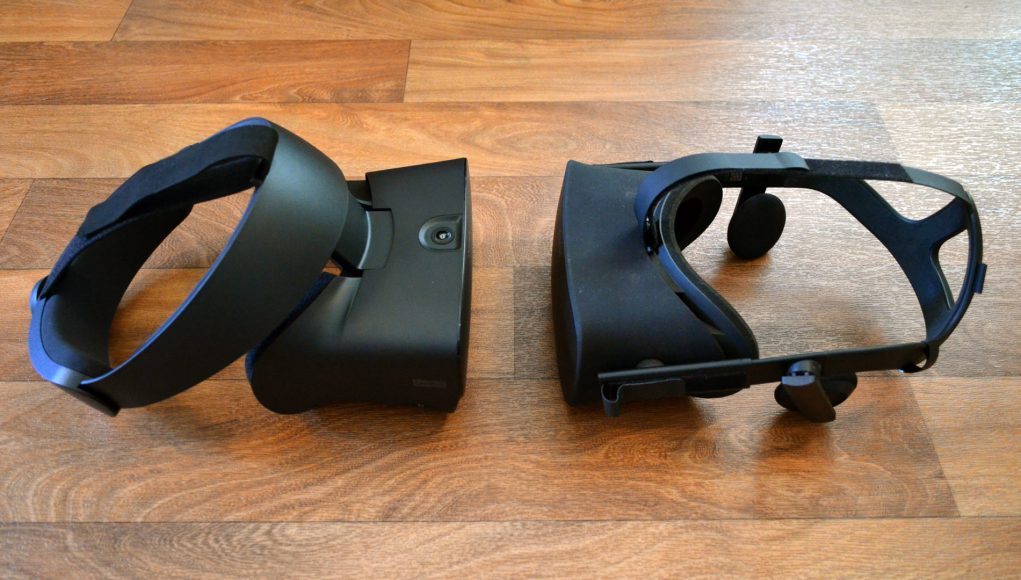After an impressive three-year tour of duty for Oculus’ first PC VR headset, the Rift, along comes the Rift S. Oculus bills the headset not as a sequel, but a remaster. With a focus on ease of use, Rift S aims to make VR more accessible and playable than ever, but that’s come at the cost of some of the original’s biggest selling points, making the headset a good choice for newcomers but a tough sell for existing Rift owners.
Update (May 4th, 2019): The write-up of our in-depth review is complete and has been added to this article.
As usual, we’ll start up top with a high level review summary followed up with an in-depth review further down.
Oculus Rift S Review Summary
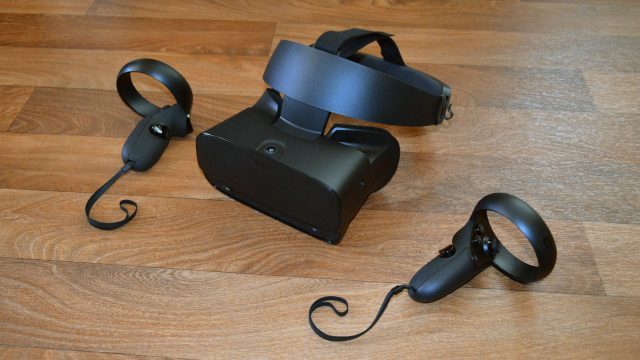
With the original Rift now discontinued, Oculus is fully replacing the headset with the Rift S. While the headsets are pretty similar at a high level (including being fully compatible with the same library of content)—there’s a few key differences, some good, some bad—that are revealed upon a closer inspection. First, let’s talk about the major differences.
For one, the Rift S effectively has an all-new design. The halo-style headband is a very different approach to fit and ergonomics than the original. The on-ear headphones have been removed in favor of speakers hidden in the headband near your ears.
Then there’s the change in tracking. While the original Rift required external cameras to track the movement of the headset and controllers, the Rift S uses ‘inside-out’ tracking which uses cameras on the headset itself to understand its movement and the position of the controllers in 3D space.
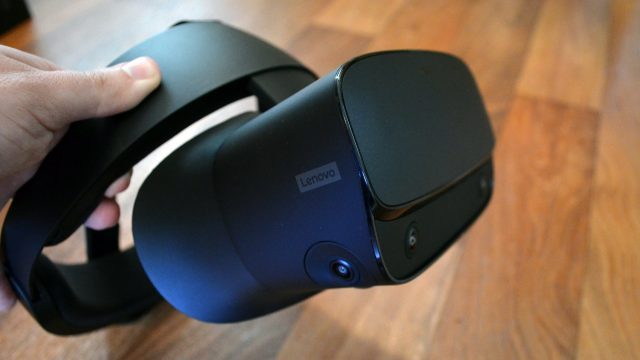
And finally, there’s the change from the original Rift’s pair of OLED displays to a single LCD display which offers higher resolution, but also necessitates the removal of the original’s IPD adjustment. Along with that new display comes new lenses too.
The Rift S is a capable headset, and it’s paired with the very strong Oculus content library. The benefits of inside-out tracking are hard to ignore; easier initial setup with no need for sensors sitting on your desk, less prep time before playing, and pass-through capabilities which make it yet easier to dive into VR.
The inside-out tracking isn’t as good as the outside-in approach of the original—not quite achieving the sub-mm jitter that makes the Rift’s tracking feel super tight—but it’s easily ‘good enough’, including being robust enough to confidently tackle Beat Saber’s hardest difficulty.
The shift from the original Rift’s head-mount approach (which was generally well liked, even three years after its debut) may turn out to be the most controversial change to the Rift S because of its implications for ergonomics. As with some other VR headsets with halo style headbands, the user has to make a choice between ideal comfort and ideal clarity—at least when it comes to my face, you can’t have both.
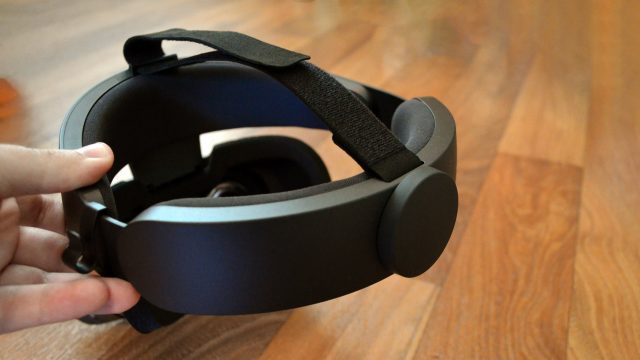
This is somewhat unsurprising considering that Oculus appears to have let Lenovo lead the design of the headset in a significant way; Lenovo is the company that made the Mirage Solo, one of worst fitting headsets I’ve ever worn. That said, the Rift S’s ergonomics are nowhere near as bad as the Mirage Solo, but they do feel like a step backward from the original Rift.
The main major problem seems to be the ability to get your eyes into the sweet spot of the lenses while achieving the most comfortable fit. Everyone’s head is shaped differently, but at least when I strap the Rift S on for comfort, I end up with my eyes too far away from the lenses, which puts me outside the sweet spot (increases blur around the periphery) and gives me a less than ideal field of view. If I strap the Rift S on for clarity, I have to really cram the visor against my face, and it’s clear that I’m sacrificing comfort to achieve that level of clarity.
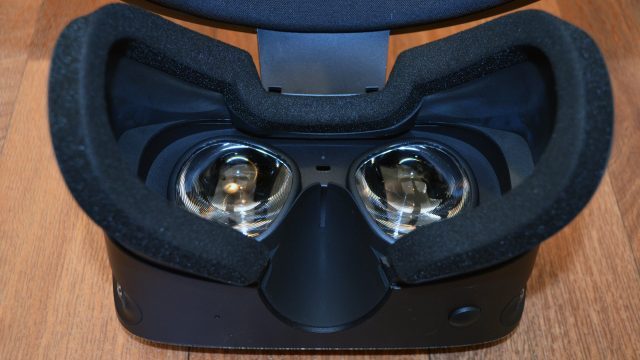
Now, I have a lot of experience in fitting headsets on my head and I know what to look for visually to dial everything in so that it looks and feels good. With the Rift S, achieving the ideal visuals is not very intuitive, and I have a feeling that many new (and even somewhat experienced) users will put the headset on in a way that’s comfortable (but not quite clear) and then complain that visuals aren’t that great. To be fair, this is a challenge that every VR headset faces, but it just seems easier than most to go wrong with the Rift S, and that’s not even accounting for the lack of physical IPD adjustment, which means that those on the outer edges of the IPD range are destined to for sub-par clarity no matter how they adjust the headset.
That said, if you get a fit that feels comfortable and looks good, the Rift S is a mostly easier to use version of its predecessor. The upgraded resolution (from 1,080 × 1,200 to 1,280 × 1,440) offers a sharper view and a nice reduction in the screen door effect (thanks to moving from OLED to LCD). The newer lenses bring a moderate reduction in internal reflections (god rays), and the sweet spot is said to be larger (though as we discussed, this is very dependent on fit). With solid inside-out tracking, you’re also getting ‘room-scale’ capabilities (large area tracking with full 360 coverage) out of the box, which is how it should be.
Along with the above, the convenience of inside-out tracking and pass-through are an important step forward that reduces the friction between wanting to jump into VR and actually doing it—which is why Rift S can be a great choice for newcomers.
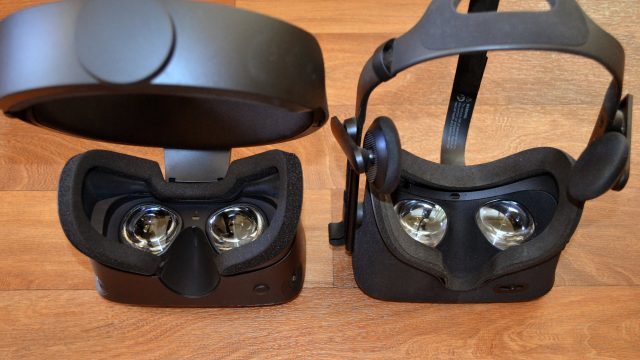
For those who have been using a Rift for three years though (and are already ok with the friction they have gotten used to), the downsides that come with the Rift S’s upsides don’t feel like three years of progress.
Beyond issues with fit, the hidden speakers in the headband are a significant step backwards in audio quality, and also results in positional audio being less clear directionally. Even if not comparing the Rift S speakers to the original Rift’s pretty darn good headphones, the Rift S audio quality still leaves me wanting, and even Oculus Quest’s hidden speakers seem to do a better job thanks to offering up a bit more bass.
Yes, there’s a 3.5mm jack, and yes you could plug in your own high quality headphones. But not only are many headphones unlikely to fit well over the headband, it’s well established that almost nobody wants to deal with a separate pair of headphones when it comes to VR headsets except the most adamant audiophiles.
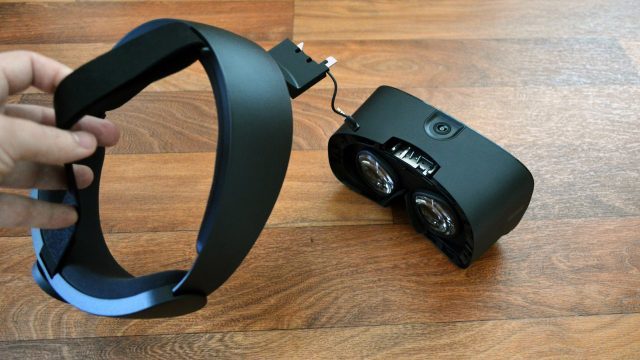
Luckily there’s a ray of hope and redemption for the Rift S’s ergonomic and audio issues. The headset has a little slider on the visor which allows it to be completely separated from the headband, and the headband itself appears to be where the speakers are located. So, Oculus could conceivably offer something like a Deluxe Audio Strap (as HTC did with the original Vive) which make the Rift S significantly more attractive to existing Rift owners who might not otherwise feel its downsides counteract its upsides. Whether or not Oculus would consider this is unclear, so only time will tell.
– – — – –
The Rift S is a good choice for newcomers who weren’t ready to jump into VR for reasons of complexity and friction. Even though there’s some ergonomic issues which are likely to impact clarity, the Rift S is still going to give users the easiest and (potentially) best looking way so far to enjoy Oculus’ strong library of VR content.
That said, the Rift S isn’t going to do much to delight veteran Rifters looking for their next step in immersion. But then again, Oculus has made it pretty clear that the goal of Rift S is to bring new users into VR—not to appease enthusiasts and early adopters.
Oculus Rift S In-depth Review
Hardware
Visuals & Audio

One of the biggest changes from the Rift to the Rift S is a new display which bumps the resolution up from 1080 x 1200 to 1,280 × 1,440. The new display also drops from a 90Hz to 80Hz refresh rate. While the difference isn’t stark, those used to 90Hz headsets might feel that things are a little less smooth, and a small number of highly sensitive people might notice more flicker in very bright scenes (80Hz didn’t bother me on the Rift S, though I have felt uncomfortable due to flicker on some other headsets with lower refresh rates). 80Hz on the Rift S, to me, doesn’t feel like a major downgrade from the 90Hz of the original Rift.
The display also moves from OLED to LCD which has pros and cons. On the pros side, the LCD display uses an RGB sub-pixel structure which means it actually has a lot more sub-pixels than an OLED display of the same resolution. This means both better fill factor (less screen door effect) and increased sharpness.
In terms of screen door effect—even at 1,280 × 1,440—the Rift S’s LCD display looks about comparable to the Vive Pro’s 1,400 x 1,600 OLED display. Between the Rift and the Rift S, the improvement in fill factor seems to me to be more substantial than the improvement in sharpness. In darker scenes and against high frequency textures, the screen door effect can nearly melt away if you aren’t looking for it. Brighter scenes and flatter textures will make it more apparent.
On the cons side, LCD lacks the dynamic range of OLED, which means that colors don’t pop as much and dark scenes are more washed out on the Rift S.
That said, OLED is often prone to significant black smearing which is most prominently seen when there’s very dark objects against very bright objects (for instance, a black square against a white background). While it generally has much less smearing as the Rift or most other VR headsets with OLED displays, the Rift S is still susceptible to a bit of smearing, though for some reason it happens more when the background is in the grey range rather than white. This isn’t obvious if you aren’t looking for it, but it crops up from time to time.
While mura (inconsistencies in brightness and color from one pixel to the next) wasn’t great on the Rift, it’s hugely improved on the Rift S, to the point of being just about invisible. Mura is typically most visible in dark, low contrast scenes, but on the Rift S it appears to be effectively non-existent.
The new lenses in the Rift S (which, as far as we know, are identical to those used in Quest and Oculus Go) do bring about a reduction in god rays and internal reflections, but they remain bothersome in high contrast scenes (especially when brighter objects are near your peripheral view while darker objects are near the center).
When it comes to field of view and ‘sweet spot’ (the ideal optical center), Oculus says both are improved over the Rift, but in my experience these two factors are significantly influenced by how close you can get the lenses to your eyes and how well you can get your eyes in the sweet spot, which has everything to do with ergonomics and fit, so we’ll dive straight into that section right after a quick note on audio.
The Rift S does away with the Rift’s on-ear headphones and instead employs hidden speakers in the headband. In theory, this means nothing in your way when putting the headset on, and nothing to press against your ears (potentially causing long-term discomfort) as you play. However, the speakers on the Rift S are a significant step backwards in audio quality, and also results in positional audio being less clear directionally. Even when not comparing the Rift S speakers to the original Rift’s pretty darn good headphones, the Rift S audio quality still leaves me wanting; even Oculus Quest’s hidden speakers seem to do a better job thanks to offering up a bit more bass.
Yes, there’s a 3.5mm jack, and yes you could plug in your own high quality headphones. But not only are many headphones unlikely to fit well over the headband, it’s well established that almost nobody wants to deal with a separate pair of headphones when it comes to VR headsets except the most adamant audiophiles.
For what Oculus says is their “most advanced, PC-powered gaming headset,” the audio quality isn’t where it needs to be. Oculus has said they’re considering an official headphone accessory for Rift S, and I think they ought to get that out the door fast and make it part of the default package.
Design & Ergonomics (and impact on visuals)
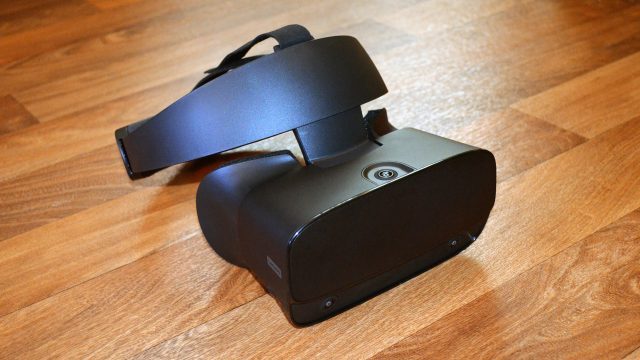
From an aesthetic standpoint, the Rift S feels like a bit of a step backward from the original Rift, which felt a little more solid and looked a little more svelte. Still, both are relatively bulky things to wear on your head, and the only thing that truly matters is whether it’s comfortable and looks good once it’s on your head. Still, it’s a little weird to see (what I would argue is) a regression in design sense when Oculus had set such a strong precedent the first time around. As far as we know, this seems to have much to do with Oculus partnering with Lenovo on the design of the Rift S—the design similarities between Lenovo’s Mirage Solo and the Rift S are clear.
While theoretically the move to a ‘halo’ style headband should increase comfort, fitting the Rift S for both comfort and visual clarity seems to be more challenging than with the Rift.
If I ignore what I’m seeing through the lenses and simply adjust the headset on my head for maximum comfort, I end up with a lower than ideal field of view and a lot of blurring around the periphery because my eyes don’t wind up very close to the sweet spot. If I want to achieve maximum visual fidelity, I need to move the headband to rest less comfortably on my forehead and also cram the face gasket as close to my face as possible, which does result in a wider field of view than the Rift and a much larger sweet spot, but it comes at the cost of a less comfortable fit.

The key issue seems to be the face gasket, which keeps the lenses too far from my eyes. Even though the Rift S has an eye-relief adjustment, this moves the entire visor at once (including the face gasket), which means I have to push the foam against my face more than I’d like if I want the lenses in the ideal position. I actually found that I could get a much wider field of view and be much more inside the sweet spot by removing the face gasket entirely; even though this meant my peripheral field of view was exposed to the outside world, it was almost preferable to play this way because of the improvements in field of view and clarity.
So, at least for the shape of my head, I have to choose either to fit the headset for ideal comfort or ideal visuals, or compromise somewhere in between. On the original Rift, I never felt like I had to make that choice. I’ve been using and fitting VR headsets for years, and I have an experienced eye for know what things should look like through the lenses—so when I’m missing a good bit of field of view or the peripheral blur is encroaching far more than it should be, I know what the issue is. For newcomers to VR (which the Rift S is positioned towards), I’m willing to bet that a non-trivial number of people are going to think the headset just doesn’t look that great (smallish field of view and blur in the perierphy) because they will suffer from poor eye placement in respect to the lenses.
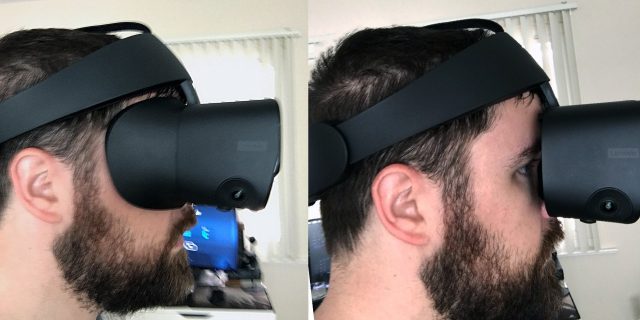
The issue with the gasket felt so bad that I actually found that I could have a much better visual experience by playing without wearing it at all; even though this exposed my peripheral view to the outside world, I got a much better field of view and a larger sweet spot more comfortably by doing so. It’s also worth noting that the way the gasket snaps back into place is less intuitive and more annoying than on Rift or Quest. This probably won’t bother most people, but if you plan to get a workout going in your headset, you’ll likely be removing it from time to time for cleaning.
The ergonomic issues created by the face gasket could be (and I think should be) addressed by offering different face gaskets to better fit a wider range of faces. Better yet, future designs should have an eye relief adjustment that’s independent of the face gasket (like we see on PSVR, Vive, Vive Pro, and Index).
There’s another adjustment factor though which can’t be fixed after the fact: the Rift S lacks a hardware IPD adjustment, which means you can’t adjust the distance between the lenses to best align with your eyes (as you could with the original Rift). The Rift S has a fixed hardware IPD of 63.5mm, which is spot on with my own, so while I’m (fortunately) not losing clarity that way, some inevitably will. Oculus says that Rift S is ‘best’ for users with an IPD between 61.5mm and 65.5mm, compared to the Rift which is ‘best’ for those between 56mm and 74mm.
So, in summary, the Rift S can be comfortable for long term play, but you very well may need to sacrifice some visual quality to achieve that comfort.
Tracking

The Rift S uses an all new ‘inside-out’ tracking system which doesn’t require any external sensors, bringing a bunch of convenience benefits. There are five cameras on the headset that look at the environment around you and figure out how your head is moving through computer vision. The cameras on the headset also see your controllers to figure out how they’re moving.
The original Rift uses an outside-in tracking system that required setting up external sensors, which only offered front-facing tracking (unless you were willing to set up a more complicated sensor configuration for greater coverage). With the inside-out system on Rift S, everything from initial setup to session-to-session use is made more convenient.
Also a plus for the inside-out tracking system is that it’s inherently ‘room-scale’, which means it tracks in all directions and across room-sized (or larger) spaces. Room-scale tracking out of the box is nice to have, but the heritage of the Rift means this feature won’t likely be well utilized for some time to come because just about all of the existing VR games made specifically for Rift assume the vast majority of users will only have a front-facing tracking setup, and this will likely continue to be the case for the foreseeable future since there will be many more Rifts out there than Rift Ss for some time to come. That said, there’s some games that do benefit from having room-scale tracking today, and the Rift S tracking system will make it easier to get the best experience out of those games.
From a performance standpoint, the Rift S tracking system is pretty darn good. Compared to the Windows VR headsets (which all use the same two-camera inside-out tracking system), Rift S is a huge improvement, specifically because its five cameras offer a drastically larger controller tracking volume which greatly reduces the frequency of controllers losing tracking. That said, Rift S tracking isn’t quite as perfromant or robust as the tracking system on the original Rift.
I was a little disappointed to see that the Rift S doesn’t fare well on the ‘tap test’ (tapping the visor with your finger to test for instantaneous latency). Doing so causes the world to jolt briefly in response to the taps, which suggests that the instantaneous latency is a little slower than you’d find on the Rift or other headsets with outside-in tracking. In most cases this isn’t an issue—prediction quickly catches up to the initial movement impulse to make the tracking feel tight—but you may notice it during moments of fast and sharp head movements (like when really going hard on Beat Saber, or head banging to the beat in Electronauts).
The Rift S also shows a bit more jitter than the Rift. Jitter comes from the limit of precision in the tracking system, and can be thought of as the average variation between tracking estimates of an object that’s completely still in reality. An ideal tracking system would have 0mm jitter, meaning that when the tracked object is sitting absolutely still, the system is recording the exact same position from one measurement to the next. This is very difficult to achieve in practice, and most tracking systems have some level of imprecision, which makes the system think that the object is jumping or ‘jittering’ in place. In the context of a VR headset, jitter means that your virtual perspective will shake in equal proportion to the jitter of the tracking system.
The gold standard for tracking precision in VR is often said to be ‘sub-millimeter’ jitter, which means the variations in tracking estimates of a still object are less than 1mm from one measurement to the next. At this level, it’s very hard to see the jitter because it’s so minute. Oculus claims sub-mm precision on the Rift, and Valve claims the same about their SteamVR Tracking system.
Even though it’s close, the Rift S doesn’t seem to hit this sub-mm mark. If you hold your head steady and look at a virtual object a few inches from your face, you’ll be able to see it shake slightly. In most cases this is something you’ll never see unless you are looking for it, and generally won’t be an issue. But too much jitter (even when it doesn’t seem obviously visible) can be uncomfortable, especially in cases where you have static virtual objects very close to your face (as your brain will naturally use them as a static frame of reference). With the Rift S, the exact amount of jitter seems likely to be impacted by how ideal (or not) your environment is for tracking. I would venture to say that this won’t be an issue for most people, but it’s is less than ideal for anyone especially sensitive to motion sickness.
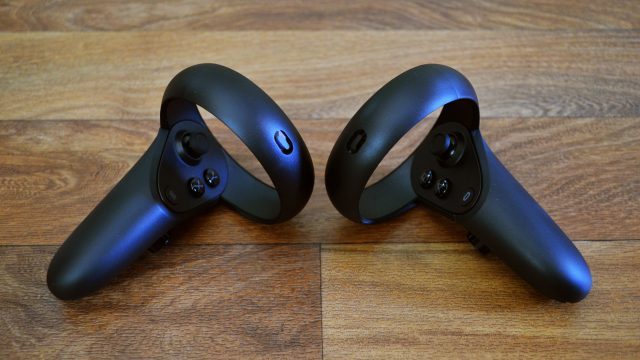
For the vast majority of users, Rift S tracking is going to be absolutely good enough for the vast majority of content. It’s good enough to play Beat Saber’s highest difficulty without frustration. Though, because the inside-out system has some inherent blind spots on controller tracking (like if you hold your controller behind your back), there are some edge cases where it could be problematic. In my testing so far this hasn’t presented any real issues (and to be fair, the default front-facing tracking on the Rift would also struggle with a controller held behind the back!). This is going to be content specific, of course, though I was really surprised to find how well the system held up to a bow game where you draw the arrow right under your chin—even in this particularly difficult case, the tracking held up the vast majority of the time and didn’t prevent me from enjoying the game. Testing the same scenario with a Windows VR headset left me frustrated at how often the controller tracking was lost.
Similar to pretty much every inside-out tracking system out there, Rift S could have trouble tracking when there’s some confounding environmental factors. Things like very bright lights or windows, large mirrors, or moving shadows could throw it for a loop. In my testing of the Rift S, I haven’t seen the tracking outright fail (and drop me to a black screen), but you will see the occasional hiccup either in the headtracking or the controllers. In general though, it feels like a very robust system that’s up to the challenge.

